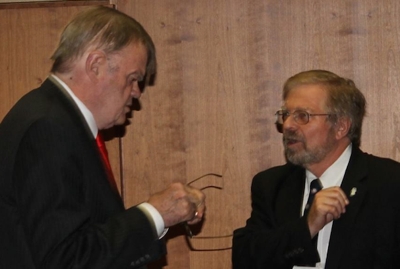In “John Updike’s ‘In the Beauty of the Lilies’: The Children” (The Imaginative Conservative, Aug. 19, 2023), Daniel J. Sundahl began with two quotes from Updike:
“As to critics, it seems to be my fate to disappoint my theological friends by not being Christian enough, while I’m too Christian for Harold Bloom’s blessing. So be it,” and “The mature and well-balanced man, standing firmly with both feet on the earth, who has never been blamed and broken and half-blinded by the scandal of life, is such the existentially godless man.”
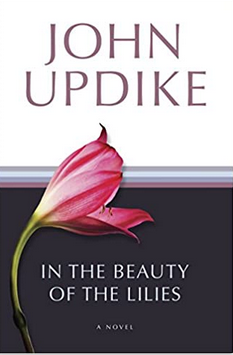 Mid-way through his essay, Sundahl remarked, “Of course there’s religion and then there’s religion and there are books and there are dirty books. . . which raises the question: Can one write about life, even life’s carnality and concupiscence, while maintaining Christian aspects?” He also, of course, attempted to answer his own question in a classical, meandering way, prompted by the last words (“the children”) of Updike’s novel, In the Beauty of the Lilies.
Mid-way through his essay, Sundahl remarked, “Of course there’s religion and then there’s religion and there are books and there are dirty books. . . which raises the question: Can one write about life, even life’s carnality and concupiscence, while maintaining Christian aspects?” He also, of course, attempted to answer his own question in a classical, meandering way, prompted by the last words (“the children”) of Updike’s novel, In the Beauty of the Lilies.
“I became fond over the years of the many contradictions regarding parents’ expectations about religion and literature, which included a smallish broo ha ha with a fundamentalist father when he learned his daughter would be reading a John Updike novel in an upper division American Literature course devoted to American Contemporary Fiction—the father arguing that although he had never read Updike he believed him scandalous and a writer of titillating, stylized pornography. Those are my words not his . . . which was singular: ‘dirty.’
“And he has a point and a good one, and I am not without empathy. As with many writers whose personal life and writings own a certain kind of ‘smudginess,’ greasy fingers on the pages, Updike is no exception. His embrace of realism as an artistic criterion (often concerning the breakdown of a marriage) is often passé these days and with gray humor. One question that emerges is whether a narrative Updike presents to his readers is a full and authentic report of human experience, which includes the particulars of the times and places of the narrative’s action, which would argue that Updike is a formal realist. Like his characters, he also put himself through many personal hardships. He had faults, and they were ‘smudgy’ and blurred.”
Read the whole essay.
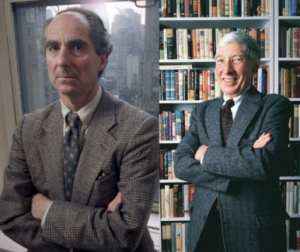 On the American Literature public Facebook group, Milan Milan Stankovic posted a consideration/comparison of two “Great American Writers” whose works offer “profound insights into American society, culture, and individual psychological and individual psychological complexities”: John Updike and Philip Roth.
On the American Literature public Facebook group, Milan Milan Stankovic posted a consideration/comparison of two “Great American Writers” whose works offer “profound insights into American society, culture, and individual psychological and individual psychological complexities”: John Updike and Philip Roth.
 Edwin Woodruff, who was given a copy of Gertrude and Claudius by a cast member when he directed the play for community theater, wrote in a Patheos column that while he found Updike’s sequel to Shakespeare’s Hamlet “a bit offputting” in the beginning, with a style that “seemed stilted and awkward and the analysis of everyone’s motivations and thoughts rather labored and obvious. But it grew on me as it went on.
Edwin Woodruff, who was given a copy of Gertrude and Claudius by a cast member when he directed the play for community theater, wrote in a Patheos column that while he found Updike’s sequel to Shakespeare’s Hamlet “a bit offputting” in the beginning, with a style that “seemed stilted and awkward and the analysis of everyone’s motivations and thoughts rather labored and obvious. But it grew on me as it went on.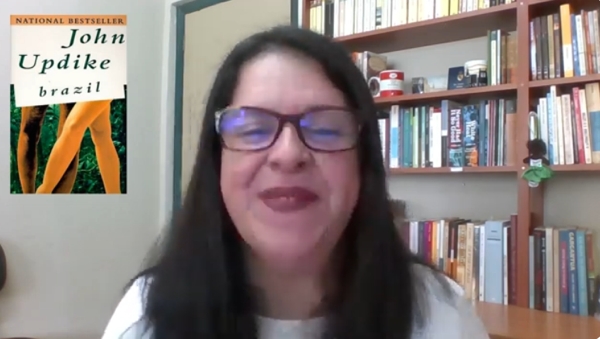 Dr. Carla Alexandra Ferreira, a Brazilian scholar whose YouTube channel is “Carla Ferreira: Literary Dialogues,” has featured brief discussions of two John Updike novels:
Dr. Carla Alexandra Ferreira, a Brazilian scholar whose YouTube channel is “Carla Ferreira: Literary Dialogues,” has featured brief discussions of two John Updike novels:  “We float above events, seeing them from the perspective of different characters, sometimes switching viewpoint over the space of a paragraph,” Jones wrote. “Rabbit, Run expresses a desire to transcend ordinary life, while also suggesting—in the manner of Ecclesiastes—that the only meaningful escape available to us lies in ordinary things. In the end, Rabbit, Run does not promise any kind of silly nirvana, but it does suggest a more liberating and interesting way of looking at the non-nirvana in which we spend our days.”
“We float above events, seeing them from the perspective of different characters, sometimes switching viewpoint over the space of a paragraph,” Jones wrote. “Rabbit, Run expresses a desire to transcend ordinary life, while also suggesting—in the manner of Ecclesiastes—that the only meaningful escape available to us lies in ordinary things. In the end, Rabbit, Run does not promise any kind of silly nirvana, but it does suggest a more liberating and interesting way of looking at the non-nirvana in which we spend our days.” On May 3, 2024, the “Novelist Spotlight: Interviews and insights with published fiction writers” blog looked in the rear-view mirror to discuss a writer who, according to host and novelist Mike Consol, wrote more beautifully in English than anyone else.
On May 3, 2024, the “Novelist Spotlight: Interviews and insights with published fiction writers” blog looked in the rear-view mirror to discuss a writer who, according to host and novelist Mike Consol, wrote more beautifully in English than anyone else. One of the
One of the  Not everyone who recognizes themselves in a writer’s fiction or poetry is pleased, but William Ecenbarger took delight in recalling his 1983 interview with John Updike that inspired Updike to write “One More Interview.” Then a writer for the Philadelphia Inquirer, Ecenbarger managed to score his interview with Updike through the writer’s mother, Linda. It was no ordinary interview.
Not everyone who recognizes themselves in a writer’s fiction or poetry is pleased, but William Ecenbarger took delight in recalling his 1983 interview with John Updike that inspired Updike to write “One More Interview.” Then a writer for the Philadelphia Inquirer, Ecenbarger managed to score his interview with Updike through the writer’s mother, Linda. It was no ordinary interview.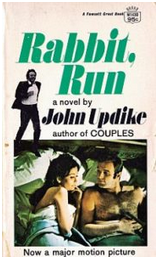
 Mid-way through his essay, Sundahl remarked, “Of course there’s religion and then there’s religion and there are books and there are dirty books. . . which raises the question: Can one write about life, even life’s carnality and concupiscence, while maintaining Christian aspects?” He also, of course, attempted to answer his own question in a classical, meandering way, prompted by the last words (“the children”) of Updike’s novel, In the Beauty of the Lilies.
Mid-way through his essay, Sundahl remarked, “Of course there’s religion and then there’s religion and there are books and there are dirty books. . . which raises the question: Can one write about life, even life’s carnality and concupiscence, while maintaining Christian aspects?” He also, of course, attempted to answer his own question in a classical, meandering way, prompted by the last words (“the children”) of Updike’s novel, In the Beauty of the Lilies.